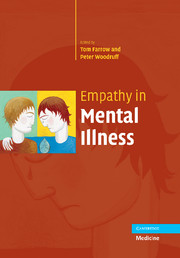Book contents
- Frontmatter
- Contents
- Foreword
- List of contributors
- Part I ‘Dysempathy’ in psychiatric samples
- 1 Empathic dysfunction in psychopathic individuals
- 2 Empathy deficits in schizophrenia
- 3 Empathy, antisocial behaviour and personality pathology
- 4 Empathy and depression: the moral system on overdrive
- 5 Empathy, social intelligence and aggression in adolescent boys and girls
- 6 Impaired empathy following ventromedial prefrontal brain damage
- 7 Non-autism childhood empathy disorders
- 8 Empathy and autism
- Part II Empathy and related concepts in health
- Part III Empathy models, regulation and measurement of empathy
- Index
4 - Empathy and depression: the moral system on overdrive
from Part I - ‘Dysempathy’ in psychiatric samples
Published online by Cambridge University Press: 17 August 2009
- Frontmatter
- Contents
- Foreword
- List of contributors
- Part I ‘Dysempathy’ in psychiatric samples
- 1 Empathic dysfunction in psychopathic individuals
- 2 Empathy deficits in schizophrenia
- 3 Empathy, antisocial behaviour and personality pathology
- 4 Empathy and depression: the moral system on overdrive
- 5 Empathy, social intelligence and aggression in adolescent boys and girls
- 6 Impaired empathy following ventromedial prefrontal brain damage
- 7 Non-autism childhood empathy disorders
- 8 Empathy and autism
- Part II Empathy and related concepts in health
- Part III Empathy models, regulation and measurement of empathy
- Index
Summary
Introduction
This chapter describes the intimate connection between empathy and depression, the epidemic of our modern world. While depression has been described as a ‘disorder of the self’, it may be more accurately characterized as a disorder of ‘concern for others’. People who are depressed most often have normal or elevated levels of empathy; however, their affect-directed, automatic causal interpretations of pain in others are often disturbed, leading to non-conscious assertions of blame, usually placed on themselves. Empathy, a socially organizing neural system, allows us to share others' feelings, to mimic without awareness, and forms the basis of our relationships and our social learning (Decety & Jackson, 2004).
A sophisticated Theory of Mind (ToM), or the ability to know what others are thinking, is sometimes considered a prerequisite for true empathy. The capacity for empathy, present in infants from the first days of life, may be independent of cognitive maturity and a developed ToM. Healthy empathy, however, requires an understanding of causality, undeveloped in very young children and affectively distorted in depression. The empathic reaction in depressives often leads to great distress because they tend to unrealistically blame themselves for pain felt by others. Thus, in mood disorders, the empathy system may be functional; however, an overly active and automatic moral system, connected to the empathic experience, tends to misinterpret attribution, and the guilt felt at believing that you have caused pain in another leads to empathic distress, an exaggerated reaction.
- Type
- Chapter
- Information
- Empathy in Mental Illness , pp. 49 - 75Publisher: Cambridge University PressPrint publication year: 2007
- 47
- Cited by



